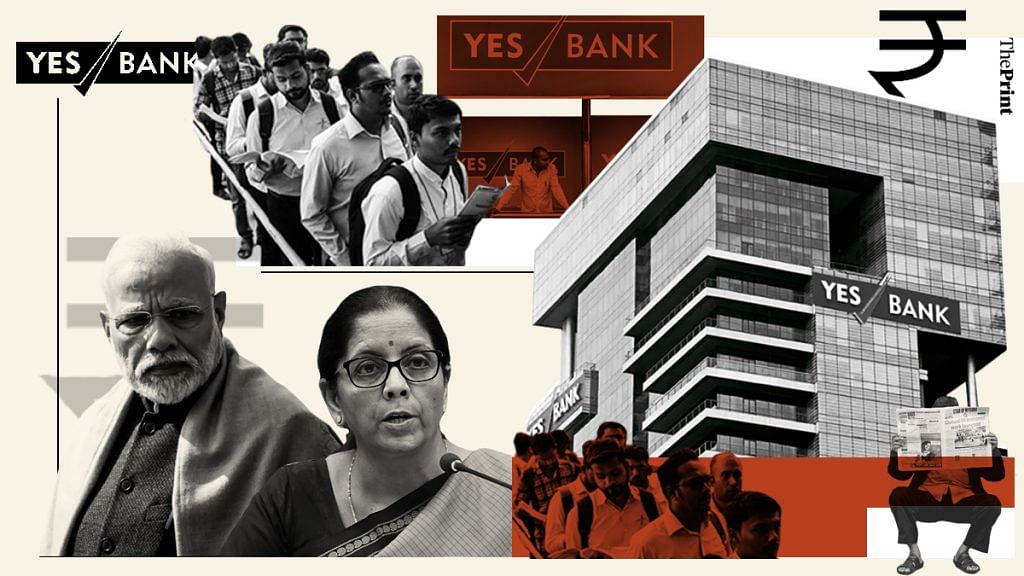The RBI has put Yes Bank under moratorium till 3 April, capping cash withdrawals at Rs 50,000. The crisis at India’s fourth-largest private lender is a reflection of the wider set of problems being faced by India’s banking and financial sector. Finance Minister Nirmala Sitharaman has asked the RBI to look into “what caused these difficulties” and announced state-owned lender SBI’s willingness to invest in Yes Bank.
ThePrint asks: Yes Bank crisis: Has Modi govt done enough to fix financial sector woes to revive economy?
Steps like Mudra scheme, loan melas and waivers have weakened the banking sector
Professor, National Institute of Public Finance and Policy
The situation of India’s banking and financial sector has been worsening for a long time now. Deteriorating balance sheets and ambiguity with regard to the treatment of non-performing assets and banking (including co-operatives) regulations have only deepened the problems. Prolonged growth slowdown and weakening fiscal positions of both the Centre and the states have also added to the woes.
While the Modi government, the RBI and the SEBI have been taking various measures — the Insolvency Bankruptcy Code, Prompt Coercive Action (PCA), proposed changes in the Banking Regulation Act, recapitalisation and merger of the PSBs (Public Sector Banks) — it appears that the problems in India’s banking sector are deep-rooted.
The Yes Bank episode suggests that the balance sheet issue is not limited to public sector banks alone, as opposed to what many were thinking. While one hopes that the Yes Bank-type problem would not be contagious, the government and the RBI need to be proactive in stabilising the sector.
Not just hesitancy but measures like Mudra, loan melas and loan waivers taken by governments have also weakened the banking sector. Hesitancy in recapitalisation of banks (no allocations in the recent Union Budget), merger of PSBs, and fear of prosecutions have hindered the growth of public sector banks.
Another structural issue that is hampering the sector is some of the government’s policy measures that actually discourage savings in the economy, which could put pressure on the banking sector performance.
Views are personal
Govt and financial sector regulators are putting in efforts, but the headwinds are too forceful and dynamic
Banking Expert & Managing partner, Ashvin Parekh Advisory Services LLP
The Narendra Modi government and India’s financial sector regulators are putting in efforts. Unfortunately, the headwinds confronting the sector and the Indian economy as a whole are too forceful and dynamic for all stakeholders to fathom.
It appears that many of the measures being taken are taking longer to have an impact, and new situations are arising.
The government and the regulators are seized with these developments and, therefore, we are lurching from one crisis to another.
The problems with India’s financial sector have their roots in a weak banking system, which is only getting weaker by the day. The recovery of non-performing assets is taking longer, and the government is unable to provide capital. New areas of sizeable debt turning bad, such as in the telecom sector, are evolving and fast decision-making is taking particularly longer.
Principle of expecting public sector giants to make up for failures of private banking is fundamentally flawed
Professor, National Institute of Advanced Studies
The Yes Bank crisis brings to the forefront the fact that the Narendra Modi government, for all its initiatives in the financial sector, has not confronted the critical aspect of the relationship between public and private institutions.
It is widely believed that before the one-month moratorium ends on 3 April, a consortium of the State Bank of India and the Life Insurance Corporation of India will take over the troubled bank. The depositors in Yes Bank will undoubtedly be relieved if this comes through and the limits on the withdrawal of their own money in the bank are lifted.
For those who have a stake in SBI and LIC there is reason to worry. These two institutions will be expected to bear the burden of the profligacy of Yes Bank’s lending.
But the principle of expecting these public sector institutions to make up for the failures of private banking is fundamentally flawed. It allows private financial institutions to be quite reckless knowing that the public sector will step in to clean the mess they have created. More importantly, if the current economic slowdown pushes more private banks the Yes Bank way, the burden could prove too great even for public sector giants like SBI and LIC.
Govt has been determined to weaken public sector banks, which are the pillars of India’s banking system
General Secretary, All Indian Bank Employees Association
The current NDA government has thoroughly failed to address the issues with India’s economy.
Banks have an important role in reviving the economy. Unfortunately, the government is not doing anything to strengthen our banks. Public sector banks (PSBs) are the pillars of India’s banking system.
Ever since banks were nationalised in 1969, PSBs have contributed immensely to economic development, especially in neglected sectors.
But the Modi government is determined to weaken PSBs. Bad loans is a major issue confronting the banks. Instead of tightening the recovery laws to ensure bad loan recovery, this government believes in resolution of bad loans. The result is huge haircuts for the banks, thus, landing them in losses.
According to the latest Economic Survey, for every rupee that a taxpayer invested in PSBs, he/she lost 23 paise on an average.
The question is about why no timely action was taken in the case of Yes Bank. What was the RBI doing all this while? Instead of strengthening the public sector banks to revive the economy, the government is only helping private-sector lenders, who are also responsible for the bad loans.
Also read: Is Indian economy equipped to deal with the global disruption caused by coronavirus?
By Unnati Sharma, journalist at ThePrint
